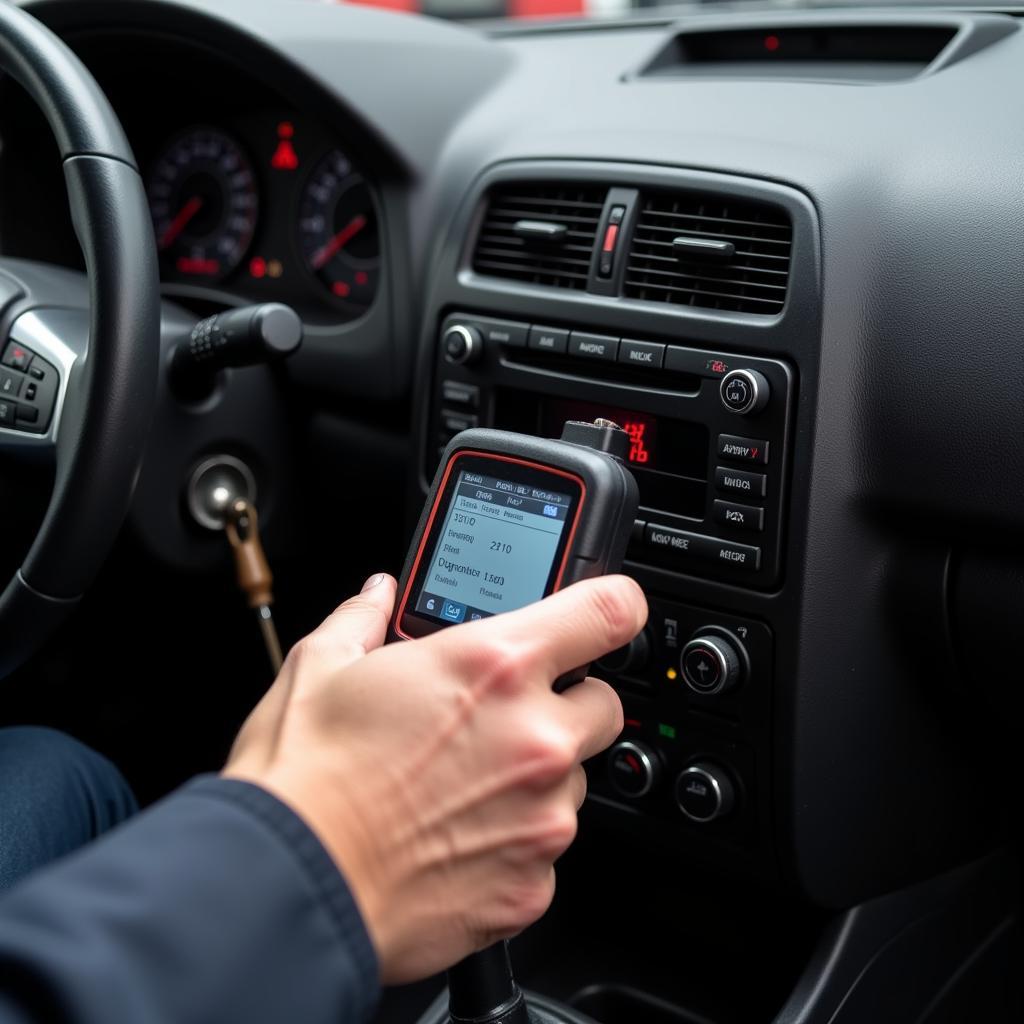Car troubles got you feeling like you’re driving blind? We’ve all been there! Wondering if that strange noise means a minor hiccup or a major breakdown is never fun. You might be asking yourself, “Can diagnostics find anything wrong with my car?” The short answer? It’s complicated.
While car diagnostic tools have become incredibly advanced, they aren’t quite crystal balls (yet!). Let’s dive into what car diagnostics can do, what their limitations are, and how they can save you time, money, and a whole lot of stress on your next trip to the mechanic.
Decoding the Language of Your Car: How Diagnostics Work
Imagine your car’s computer system speaking a secret language – one full of codes and signals about its health and performance. A car diagnostic tool acts as your translator, plugging into your car’s onboard computer (OBD-II port) to decipher these messages.
 Car Diagnostic Tool Connected to OBD Port
Car Diagnostic Tool Connected to OBD Port
Think of it like this: when your “Check Engine” light illuminates, it’s your car sending a signal. The diagnostic tool reads that signal, deciphers the code, and tells you what the problem might be – from a loose gas cap to a misfiring engine.
What Car Diagnostics Can Tell You
The beauty of a car diagnostic tool lies in its ability to pinpoint a wide range of potential issues, including:
- Engine Performance: Misfires, fuel system problems, oxygen sensor malfunctions, and more.
- Emissions System: Issues with the catalytic converter, evaporative emissions system, and other components.
- Transmission Problems: Slipping gears, rough shifting, and other transmission-related concerns.
- Brake System: Problems with the ABS (Anti-lock Braking System) or other braking components.
- Airbag System: Faults in the airbag control module or sensors.
- Other Electronic Systems: Issues with the power windows, door locks, and other electronic systems.
The Limits of Diagnostics: When It’s Not a Magic Wand
While undeniably powerful, car diagnostics have their limitations. Here’s the catch:
-
Diagnostics Show Symptoms, Not Always the Cause: Imagine your car’s like your body, and the “Check Engine” light is a fever. The diagnostic tool can tell you have a fever but not why. You might need additional tests (like bloodwork) to determine the root cause. Similarly, a diagnostic tool might indicate a faulty oxygen sensor, but further investigation is needed to determine why it failed. Was it just old, or is there a problem with the catalytic converter?
-
Mechanical Issues Might Fly Under the Radar: While diagnostics excel at electrical and computer-related issues, they might miss purely mechanical problems. A worn-out clutch or a suspension issue might not trigger a code.
-
Interpretation is Key: Just like a doctor interprets your test results, a skilled mechanic interprets the diagnostic codes. Having the right knowledge and experience is crucial for accurate diagnosis and repair.
Why You Shouldn’t Ignore Car Diagnostics
Even with their limitations, car diagnostic tools are invaluable for car owners and mechanics alike. Here’s why:
- Early Detection Saves Money: Catching problems early can prevent costly repairs down the line.
- Targeted Repairs Save Time: No more playing the guessing game with your mechanic! Diagnostics help pinpoint the problem area, saving you time and potentially unnecessary repairs.
- Peace of Mind: Knowing the potential issues with your car gives you peace of mind on the road.
Can Diagnostics Find Anything Wrong? Not Quite, But…
While not a foolproof method, car diagnostics are an essential tool for understanding your car’s health. They provide valuable information, enabling you to make informed decisions about your car’s maintenance and repair.
By understanding both the capabilities and limitations of car diagnostics, you can use them to your advantage, keeping your car running smoothly and your wallet a little bit fuller.
FAQs
Q: How often should I get a car diagnostic check?
A: It’s generally recommended to get a car diagnostic check annually or whenever your “Check Engine” light comes on.
Q: Can I use a car diagnostic tool myself?
A: Yes, there are affordable OBD-II scanners available for DIY car enthusiasts. However, interpreting the codes accurately often requires mechanical knowledge.
Q: Will a car diagnostic check drain my car battery?
A: No, a quick diagnostic check will not drain your battery.
Q: Does my car need to be running for a diagnostic check?
A: No, your car does not need to be running for a diagnostic check, but the ignition should be in the “on” position.
Q: Can a car diagnostic tool reset my “Check Engine” light?
A: Yes, most car diagnostic tools can reset the “Check Engine” light, but this is not a fix. The light will reappear if the underlying issue is not addressed.
Need help diagnosing a car problem? Contact our expert team via WhatsApp: +1(641)206-8880 or email: [email protected] for 24/7 support. We’re always here to help you get back on the road!

Leave a Reply